| Listing 1 - 10 of 17 | << page >> |
Sort by
|
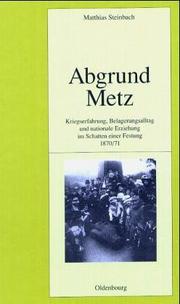
ISBN: 3486832964 3486566091 9783486832969 Year: 2002 Publisher: De Gruyter
Abstract | Keywords | Export | Availability | Bookmark
 Loading...
Loading...Choose an application
- Reference Manager
- EndNote
- RefWorks (Direct export to RefWorks)
Der Krieg um Metz und die Belagerung der Festung im Jahre 1870 gehören zu den eher vernachlässigten Ereignissen des Deutsch-Französischen Krieges. Von den symbolisch hoch aufgeladenen und in der Erinnerung tief verankerten Schauplätzen Sedan oder Versailles verdeckt, wird leicht übersehen, dass die Kapitulation der Festung Metz militärisch von kriegsentscheidender Bedeutung war und das Schicksal Elsass-Lothringens bestimmte. Zugleich sind die Ereignisse um Metz Beispiel dafür, dass Krieg, wie bei Clausewitz nachzulesen, ein sich Einlassen auf Ungewisses, wenig Kalkulierbares bedeutet, denn keineswegs ging alles so glatt, wie die gefilterte Memoirenliteratur späterer Jahre glauben machen wollte, und die Opferzahlen lagen im Vergleich zu allen anderen Kriegsschauplätzen ungeheuer hoch. Ziel der Studie ist es, den Ausnahmezustand des Kriegsalltags mit all seinen Folgen für Soldaten und Zivilisten innerhalb des Festungs- und Garnisonsstandortes zu schildern. Über die Lebens- und Gedankenwelt der Menschen im Banne des Ereignisses hinaus wird nach den davon ausgehenden Wirkungslinien in die Zwischenkriegszeit gefragt - nach Metz als einem Schauplatz und Erinnerungsort nationaler Erziehung.
Franco-Prussian War, 1870-1871 --- Campaigns --- Metz (France) --- France --- Germany --- History --- History, Military --- Politics and government. --- Franco-German War, 1870-1871
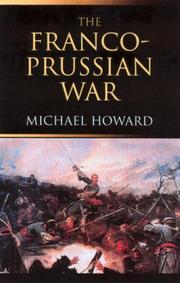
ISBN: 0415266718 Year: 2001 Publisher: London Routledge, Taylor & Francis Group
Abstract | Keywords | Export | Availability | Bookmark
 Loading...
Loading...Choose an application
- Reference Manager
- EndNote
- RefWorks (Direct export to RefWorks)
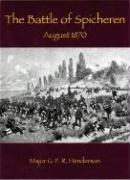
ISBN: 1907677577 9781907677571 9781874622444 1874622442 Year: 2009 Publisher: Solihull Helion & Co.
Abstract | Keywords | Export | Availability | Bookmark
 Loading...
Loading...Choose an application
- Reference Manager
- EndNote
- RefWorks (Direct export to RefWorks)
This account, penned by a noted British military historian of the late nineteenth century, remains one of the nest narratives of a nineteenth century battle yet published. Henderson based this detailed and considered account of one of the opening battles of the Franco-Prussian War upon not only General Staff works and other official sources, but also many other accounts, including regimental histories. Also includes comprehensive maps.
Book
ISBN: 3506717405 9783506717405 Year: 2004 Volume: 97 Publisher: Munich: Schöningh,
Abstract | Keywords | Export | Availability | Bookmark
 Loading...
Loading...Choose an application
- Reference Manager
- EndNote
- RefWorks (Direct export to RefWorks)
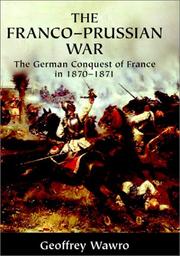
ISBN: 110738527X 128111295X 9786611112950 0511338376 1139130005 0511337817 0511336632 0511511825 0511337280 9780511338373 9780511252150 0511252153 9780511253607 0511253605 9781281112958 9780511337284 9780511336638 0521584361 9780521584364 0521584361 9780521584364 9780511511820 9780521617437 052161743X 6611112952 9781139130004 9780511337819 110715734X Year: 2003 Publisher: Cambridge, UK New York Cambridge University Press
Abstract | Keywords | Export | Availability | Bookmark
 Loading...
Loading...Choose an application
- Reference Manager
- EndNote
- RefWorks (Direct export to RefWorks)
The Franco-Prussian War of 1870-1 violently changed the course of European History. Alarmed by Bismarck's territorial ambitions and the Prussian army's crushing defeats of Denmark in 1864 and Austria in 1866, French Emperor Napoleon III vowed to bring Prussia to heel. Digging into many European and American archives for the first time, Geoffrey Wawro's The Franco-Prussian War describes the war that followed in thrilling detail. While the armies mobilized in July 1870, the conflict appeared 'too close to call'. Prussia and its German allies overwhelmingly outnumbered the French. But Marshal Achille Bazaine's grognards ('old grumblers') were the stuff of legend, the most resourceful, battle-hardened, sharp-shooting troops in Europe. From the political intrigues that began and ended the war to the bloody battles at Gravelotte and Sedan and the last murderous fights on the Loire and in Paris, this is a stunning, authoritative history of the Franco-Prussian War.
Franco-Prussian War, 1870-1871. --- Franco-German War, 1870-1871 --- France --- Germany --- History --- History, Military --- #A0507HI --- Franco-Prussian War, 1870-1871 --- Second Empire, 1852-1870 --- History [Military ] --- 19th century --- Arts and Humanities

ISBN: 1134734697 1280373989 9786610373987 0203134249 9780203134245 020317920X 9780203179208 9781280373985 6610373981 0415154332 9780415154338 9781134734641 9781134734689 9781134734696 9781138156203 1134734689 Year: 1997 Publisher: London New York Routledge
Abstract | Keywords | Export | Availability | Bookmark
 Loading...
Loading...Choose an application
- Reference Manager
- EndNote
- RefWorks (Direct export to RefWorks)
In Napoleon III and the Second Empire, Roger D. Price considers the mid-century crisis which provided Louis-Napoleon Bonaparte with the opportunity to gain elective office as President. The author outlines the objectives of Napoleon III and provides: * A historiographical review of the ruler and his regime * Details of changing historical attitudes to the period * A survey of Napoleon III's economic, social and political impact * An outline of the man's reign and his achievements
Franco-Prussian War, 1870-1871 --- Franco-German War, 1870-1871 --- Influence. --- Napoleon --- Bonaparte, Charles-Louis-Napoléon, --- Bonaparte, Louis-Napoléon, --- Bonaparte, Napoléon-Louis, --- Louis-Napoléon, --- Ludwik Napoleon, --- France --- Kings and rulers --- History
Book
ISBN: 0773596356 9780773596351 9780773596368 0773596364 9780773544093 0773544097 Year: 2014 Publisher: Montreal McGill-Queen's University Press
Abstract | Keywords | Export | Availability | Bookmark
 Loading...
Loading...Choose an application
- Reference Manager
- EndNote
- RefWorks (Direct export to RefWorks)
The British ambassador in Washington during the US Civil War and ambassador in Paris before and after the Franco-Prussian war, Lord Lyons (1817-1887) was one of the most important diplomats of the Victorian period. Although frequently featured in histories of the United States and Europe in the second half of the nineteenth century, and in discussions and analyses of British foreign policy, he has remained an ill-defined figure. In Lord Lyons: A Diplomat in an Age of Nationalism and War, Brian Jenkins explains the man and examines his career. Based on a staggering study of primary sources, he presents a convincing portrait of a subject who rarely revealed himself personally. Though he avoided publicity, Lyons came to be regarded as his nation's premier diplomat as his career took him to the heart of the great international issues and crises of his generation. As minister to the United States he played a vital role in preserving Anglo-American peace and was a powerful voice opposing Anglo-French intervention in the Civil War. While ambassador to the Ottoman Empire, he helped to prevent French control of the Suez Canal then under construction. In France, he maintained an amiable and constructive relationship with a bitter nation struggling to reorganize itself and its constitution after the Franco-Prussian War. For many historians Lord Lyons has been difficult to ignore but hard to admire. In rescuing him as a truly important historical figure, Jenkins details for the first time the personal and public strategies Lyons employed through decades of exemplary diplomatic service on both sides of the Atlantic. -- Provided by publisher.
Diplomats --- Diplomatic and consular service, British --- Franco-Prussian War, 1870-1871 --- Franco-German War, 1870-1871 --- British diplomatic and consular service --- History --- Diplomatic history. --- Lyons, Richard Bickerton Pemell Lyons, --- Lyons, --- Great Britain --- United States --- Foreign relations --- Diplomacy --- Diplomatic history
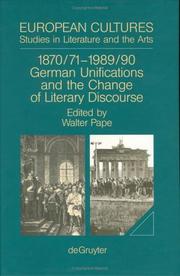

ISBN: 3110870452 3110138786 9783110870459 9783110138788 Year: 2013 Volume: 1 Publisher: Berlin Boston
Abstract | Keywords | Export | Availability | Bookmark
 Loading...
Loading...Choose an application
- Reference Manager
- EndNote
- RefWorks (Direct export to RefWorks)
German literature --- Nationalism in literature. --- Franco-Prussian War, 1870-1871. --- Political aspects. --- Germany --- History --- 82:93 --- 830 "18/19" --- -German literature --- -Nationalism in literature --- Franco-Prussian War, 1870-1871 --- -Franco-German War, 1870-1871 --- 82:93 Literatuur en geschiedenis --- Literatuur en geschiedenis --- 830 "18/19" Duitse literatuur--Hedendaagse Tijd --- Duitse literatuur--Hedendaagse Tijd --- Political aspects --- Nationalism in literature --- Guerre franco-allemande, 1870-1871 --- Littérature allemande --- Nationalisme dans la littérature --- Aspect politique --- Allemagne --- Histoire --- Franco-German War, 1870-1871
Book
ISBN: 1473831458 147383287X 9781473831452 9781781593547 178159354X 9781473832879 Year: 2013 Publisher: Barnsley, South Yorkshire
Abstract | Keywords | Export | Availability | Bookmark
 Loading...
Loading...Choose an application
- Reference Manager
- EndNote
- RefWorks (Direct export to RefWorks)
Tension and rivalry between France and Germany shaped the history of Western Europe in the century from 1860. Three times that hostility led to war and the invasion of France - in 1870, 1914 and 1940. The outcomes of the battles that followed reset the balance of power across the continent. Yet the German invasions tend to be viewed as separate events, in isolation, rather than as connected episodes in the confrontation between the two nations.
Franco-Prussian War, 1870-1871. --- World War, 1914-1918 --- World War, 1939-1945 --- Franco-German War, 1870-1871 --- Campaigns --- International relations. --- Military campaigns. --- History. --- Franco-Prussian War (1870-1871). --- World War (1914-1918). --- World War (1939-1945). --- 1870-1871. --- Germany --- France --- Western Front (World War (1939-1945)). --- France. --- Germany. --- Western Front (World War (1914-1918)). --- History, Military. --- Relations
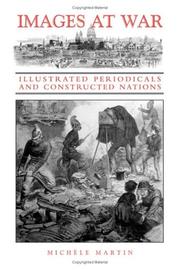
ISBN: 128202339X 9786612023392 1442675993 9781442675995 9781282023390 0802037577 9780802037572 1487558708 Year: 2006 Publisher: Toronto, Ont. University of Toronto Press
Abstract | Keywords | Export | Availability | Bookmark
 Loading...
Loading...Choose an application
- Reference Manager
- EndNote
- RefWorks (Direct export to RefWorks)
"Using the press coverage of the Franco-Prussian war as a starting point, Michele Martin's Images at War examines nineteenth-century illustrated periodicals published in France, Germany, England, and Canada (with references also to Italy and the United States), and argues that during that era they worked to reinforce particular national identities." "The images that appeared played an essential role in how the concept of nationalism was expressed and reproduced, usually by pitting cultures and countries against one another. These illustrated periodicals helped to shape nations where nations had not previously existed - such as Germany, Italy, and Canada, which were only just coming into their own as states. In war, Martin observes, these documents also represented a non-verbal method of communicating emotionally trying, politically challenging, and oftentimes contradictory information to the public, literate and non-literate alike." "The history of nineteenth-century illustrated papers underscores their legitimacy as a form of journalism. They were more than a commodity produced for profit; they offered serious reflection and commentary designed by editors to have specific effects on the readers. Images at War is a study of this early news medium and its part in the construction of nationalism in the midst of war."--Jacket.
Franco-Prussian War, 1870-1871 --- Illustrated periodicals --- Press and politics --- Franco-German War, 1870-1871 --- Politics and the press --- Press --- Advertising, Political --- Government and the press --- Journalism --- Periodicals --- Journalism, Pictorial --- Photojournalism --- Press coverage --- History --- Political aspects --- Canada. --- Engeland. --- Duitsland. --- Frankrijk. --- Europe. --- Canada (Province) --- Canadae --- Ceanada --- Chanada --- Chanadey --- Dominio del Canadá --- Dominion of Canada --- Jianada --- Kʻaenada --- Kaineḍā --- Kanada --- Ḳanadah --- Kanadaja --- Kanadas --- Ḳanade --- Kanado --- Kanakā --- Province of Canada --- Republica de Canadá --- Yn Chanadey --- Council of Europe countries --- Eastern Hemisphere --- Eurasia --- 1800-1899
| Listing 1 - 10 of 17 | << page >> |
Sort by
|

 Search
Search Feedback
Feedback About UniCat
About UniCat  Help
Help News
News